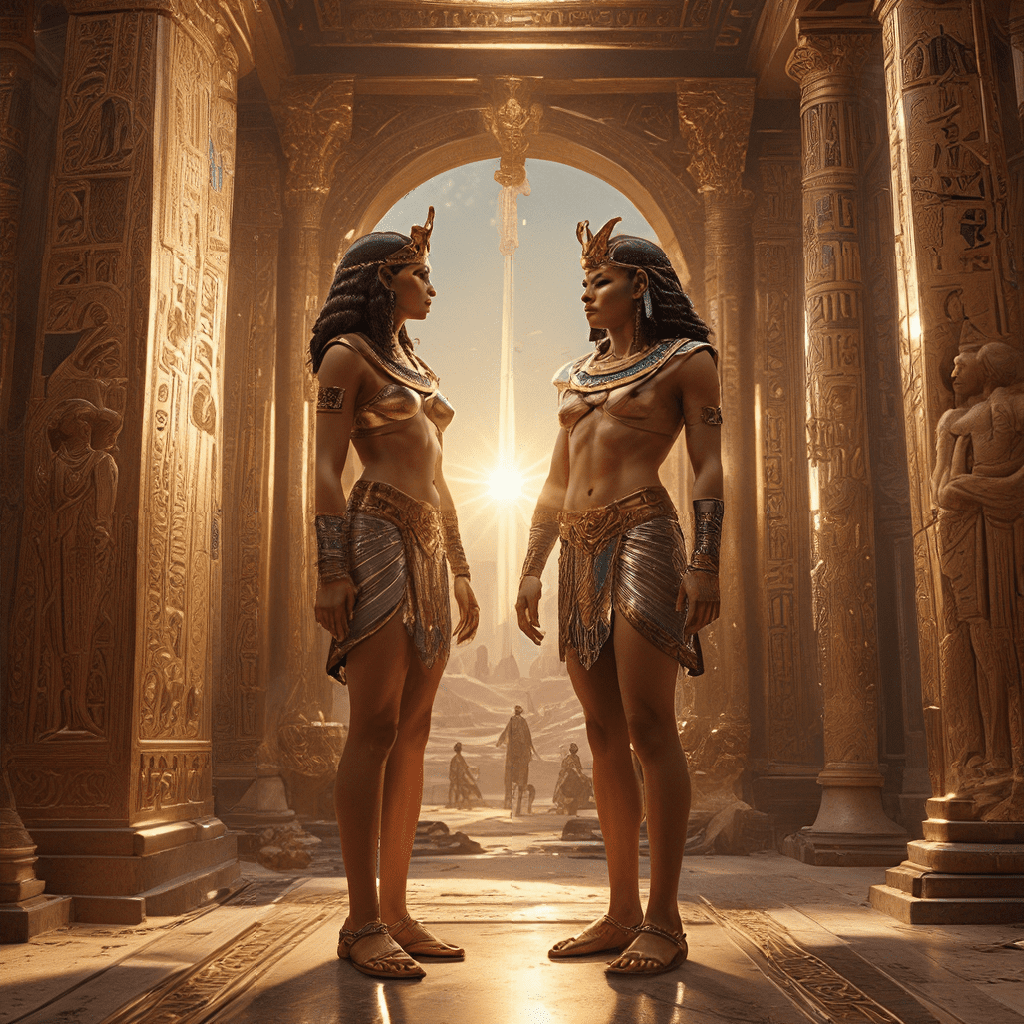The Egyptian Creation Myth: A Mirror to Humanity
I. Introduction:
Creation myths have held immense power throughout history, providing answers to fundamental questions about existence and our place in the universe. The Egyptian creation myth, a complex and multifaceted narrative, offers a captivating glimpse into the beliefs and values of ancient Egyptian civilization. This myth, steeped in symbolism and rich in detail, resonates with us even today, echoing universal themes of creation, order, and the human condition.
The Egyptian creation myth is more than just a story; it’s a reflection of ancient Egyptian society, their worldview, and their understanding of the divine. It offers insights into their beliefs about the origin of the world, the nature of the gods, and the role of humanity in the cosmic scheme. From its profound implications about the nature of existence to its impact on the daily lives of the Egyptians, this myth continues to intrigue and inspire.
II. The Cosmic Egg: The Origins of Existence
At the heart of the Egyptian creation myth lies the concept of Atum, the self-created god, who emerged from the primordial waters of Nun. This vast, formless, and chaotic ocean represented the very essence of non-existence before creation. Atum, the first being, represented the ultimate force of creation. He emerged from the waters, often visualized as a cosmic egg, the symbol of potential and the beginning of everything.
The cosmic egg, as a symbolic motif, is found in various cultures worldwide, highlighting the universality of the concept of creation from a single source. In Egyptian mythology, the egg represents the singularity from which all things originate, a powerful reminder of the inherent potential of the universe and the cyclical nature of life and death.
III. The Emergence of Order from Chaos
With Atum’s emergence from Nun, the process of creation began. The world, as we know it, was meticulously crafted through Atum’s divine acts. This act of creation involved bringing order to the chaos, a concept central to Egyptian cosmology.
The concept of *Ma’at*, a fundamental principle in Egyptian belief, embodies harmony, balance, and justice. Ma’at represents the cosmic order that governs the universe, ensuring stability and fairness. The creation myth emphasizes the triumph of Ma’at over the primordial chaos, a theme that underscores the importance of order and justice in Egyptian society.
IV. The Creation of the Gods: A Divine Family Tree
From Atum, the divine family tree began to branch out. Through self-fertilization, Atum created Shu, the god of air, and Tefnut, the goddess of moisture. These two deities, representing the essential elements of the world, gave birth to Geb, the god of earth, and Nut, the goddess of sky.
The creation of the gods illustrates a hierarchical order within the divine realm. From the solitary Atum, the universe expanded, forming a complex and interconnected family of gods, each with their specific roles and domains. This divine family played a significant role in Egyptian mythology, representing the forces that govern the natural world and human affairs.
V. The Story of Osiris, Isis, and Horus: A Cycle of Death and Rebirth
One of the most famous and influential myths within the Egyptian pantheon is the story of Osiris, Isis, and Horus. Osiris, the god of the underworld and resurrection, was murdered by his jealous brother Seth. Isis, Osiris’s wife, resurrected him, but their son, Horus, was destined to avenge Osiris’s death and claim his rightful place as king.
The myth of Osiris, Isis, and Horus reflects the Egyptians’ belief in the cyclical nature of life and death, a concept closely tied to the annual flooding of the Nile River. Just as the Nile’s waters receded, only to return and bring fertility to the land, so too did Osiris rise from the dead, symbolizing the promise of life after death. This myth reinforces the importance of the afterlife and the Egyptians’ belief in a spiritual journey that transcended physical death.
VI. The Creation of Humanity: A Divine Gift or a Challenge?
The Egyptian creation myth offers different versions of human creation. One account suggests that humanity was formed from the soil, while another states that humans were fashioned from the tears of Ra, the sun god. Regardless of the specific account, the creation of humanity in the Egyptian myth is a testament to the divine power and the connection between gods and mortals.
The creation of humanity in the Egyptian myth highlights the concept of divine judgment and human responsibility. Humans are responsible for their actions and must strive to live in harmony with *Ma’at*, upholding the principles of justice and order. This emphasis on human responsibility reinforces the importance of ethical conduct and the consequences of one’s choices.
VII. The Myth as a Reflection of Egyptian Society
The Egyptian creation myth reinforces the social hierarchy of ancient Egyptian society. The myth’s emphasis on the pharaoh’s divine lineage connects him directly to the gods, solidifying his role as a divine king and the embodiment of *Ma’at* on earth.
The Egyptian creation myth also reflects the crucial role of agriculture in Egyptian society. The cycle of creation, from the primordial waters to the fertile land, mirrors the annual cycle of the Nile River. The myth underscores the importance of agriculture, the source of life and prosperity, and the Egyptians’ deep connection to their environment.
The Egyptian creation myth is more than just a captivating story; it’s a powerful reflection of ancient Egyptian society, their values, and their beliefs. It offers a window into their understanding of the universe, their relationship with the divine, and their place in the cosmic order. This myth continues to resonate with us today, reminding us of the enduring power of creation stories and their ability to shape our understanding of ourselves and the world around us.




